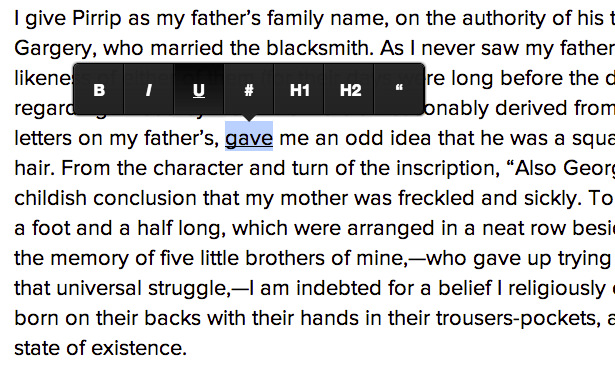This is a clone of medium.com inline editor toolbar.
Since I always had problems with bloated editors and I loved the simplicity of medium.com solution I've tried to implement their WYSIWYG approach with this script.
MediumEditor has been written using vanilla JavaScript, no additional frameworks required.
Tested on Google Chrome, Firefox and IE9+.
demo: http://daviferreira.github.io/medium-editor/
First, you need to attach medium editor's stylesheet to your page:
<link rel="stylesheet" href="css/medium-editor.css">The next step is to reference the editor's script and instantiate a new MediumEditor object:
<script src="js/medium-editor.js"></script>
<script>var editor = new MediumEditor('.editable');</script>The above code will transform all the elements with the .editable class into HTML5 editable contents and add the medium editor toolbar to them.
You can also pass a list of HTML elements:
var elements = document.querySelectorAll('.editable'),
editor = new MediumEditor(elements);- allowMultiParagraphSelection: enables the toolbar when selecting multiple paragraphs/block elements. Default: true
- anchorInputPlaceholder: text to be shown as placeholder of the anchor input. Default: Paste or type a link
- buttons: the set of buttons to display on the toolbar. Default: ['bold', 'italic', 'underline', 'anchor', 'header1', 'header2', 'quote']
- buttonLabels: type of labels on the buttons. Values: 'fontawesome',
{'bold': '<b>b</b>', 'italic': '<i>i</i>'}. Default: false - delay: time in milliseconds to show the toolbar. Default: 0
- diffLeft: value in pixels to be added to the X axis positioning of the toolbar. Default: 0
- diffTop: value in pixels to be added to the Y axis positioning of the toolbar. Default: -10
- disableReturn: enables/disables the use of the return-key. You can also set specific element behavior by using setting a data-disable-return attribute. Default: false
- disableToolbar: enables/disables the toolbar, adding only the contenteditable behavior. You can also set specific element behavior by using setting a data-disable-toolbar attribute. Default: false
- firstHeader: HTML tag to be used as first header. Default: h3
- forcePlainText: Forces pasting as plain text. Default: true
- placeholder: Defines the default placeholder for empty contenteditables. You can overwrite it by setting a data-placeholder attribute on your elements. Default: 'Type your text'
- secondHeader: HTML tag to be used as second header. Default: h4
- targetBlank: enables/disables target="_blank" for anchor tags. Default: false
Example:
var editor = new MediumEditor('.editable', {
anchorInputPlaceholder: 'Type a link',
buttons: ['bold', 'italic', 'quote'],
diffLeft: 25,
diffTop: 10,
firstHeader: 'h1',
secondHeader: 'h2',
delay: 1000,
targetBlank: true
});Medium Editor, by default, will show only the buttons listed above to avoid a huge toolbar. There are a couple of extra buttons you can use:
- superscript
- subscript
- strikethrough
- unorderedlist
- orderedlist
- pre
- image (this simply converts selected text to an image tag)
Check out the Wiki page for a list of available themes: https://github.com/daviferreira/medium-editor/wiki/Themes
- .deactivate(): disables the editor
- .activate(): re-activates the editor
- .serialize(): returns a JSON object with elements contents
Pavel Linkesch has developed a jQuery plugin to upload images following Medium.com functionality. Check it out at http://orthes.github.io/medium-editor-insert-plugin/
Thijs Wijnmaalen hacked together an AngularJS directive. Check it out at https://github.com/thijsw/angular-medium-editor
MediumEditor development tasks are managed by Grunt. To install all the necessary packages, just invoke:
npm installThese are the available grunt tasks:
- js: runs jslint and jasmine tests and creates minified and concatenated versions of the script;
- css: runs compass and csslint
- test: runs jasmine tests, jslint and csslint
- watch: watch for modifications on script/scss files
The source files are located inside the src directory. MediumEditor stylesheet was created using sass/compass, make sure you have the compass gem installed on your system.
- Fork it
- Create your feature branch (
git checkout -b my-new-feature) - Test your changes to the best of your ability.
- Update the documentation to reflect your changes if they add or changes current functionality.
- Commit your changes (
git commit -am 'Added some feature') - Push to the branch (
git push origin my-new-feature) - Create new Pull Request
project : medium-editor
repo age : 8 months
active : 85 days
commits : 366
files : 43
authors :
278 Davi Ferreira 76.0%
20 Maxime de Visscher 5.5%
8 Pedro Nasser 2.2%
8 Derek Odegard 2.2%
8 Jarl Gunnar T. Flaten 2.2%
4 minikomi 1.1%
4 Sebastian Zuchmanski 1.1%
3 Dmitri Cherniak 0.8%
3 Andrew Hubbs 0.8%
3 arol 0.8%
3 Troels Knak-Nielsen 0.8%
2 Nikita Korotaev 0.5%
1 Nic Malan 0.3%
1 Noah Paessel 0.3%
1 Pavel Linkesch 0.3%
1 Tom MacWright 0.3%
1 happyaccidents 0.3%
1 mbrookes 0.3%
1 muescha 0.3%
1 t_kjaergaard 0.3%
1 typify 0.3%
1 Adam Mulligan 0.3%
1 waffleio 0.3%
1 Bitdeli Chef 0.3%
1 David Collien 0.3%
1 David Hellsing 0.3%
1 Denis Gorbachev 0.3%
1 Jeff Welch 0.3%
1 Mark Kraemer 0.3%
1 Max 0.3%
1 Maxime Dantec 0.3%
1 Maxime De Visscher 0.3%
1 Michael Kay 0.3%
1 Moore Adam 0.3%
"THE BEER-WARE LICENSE" (Revision 42):
As long as you retain this notice you can do whatever you want with this stuff. If we meet some day, and you think this stuff is worth it, you can buy me a beer in return.



